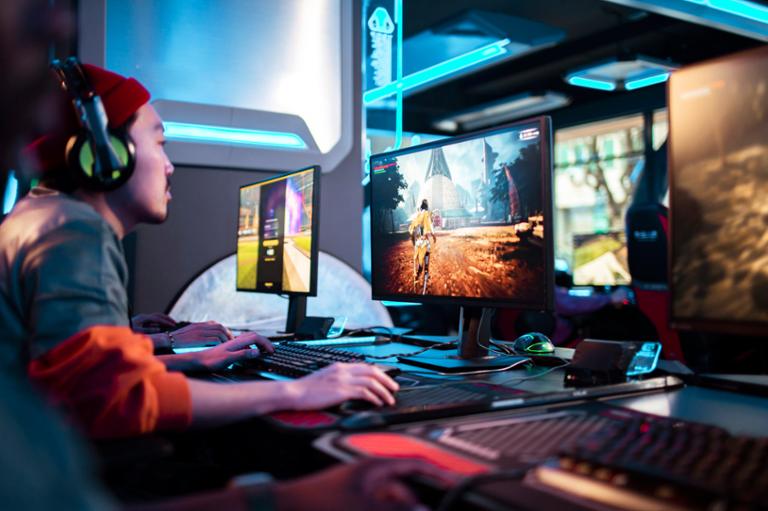For avid gamers, there’s never been a better time to turn your passion into a viable career as a game developer. Technological advancements and the rise of different types of development houses, genres and gaming platforms are propelling the industry’s growth and expansion, creating more jobs for developers than ever before.
“Game development used to be a pipe dream career,” explained Thomas Stewart, who turned his gaming hobby into a real job as a Unity game developer. The democratization of gaming has opened up new opportunities and possibilities, he added.
To put things in perspective, there are currently more than two billion gamers across the world. This will drive the industry to grow from $220 billion in 2022 to more than $583 billion in annual revenue by 2030.
Despite the rising demand, newly minted game developers should still expect to face some pretty stiff competition for open positions. That’s reflected in the salary, as well. The average salary for a game developer in the US is $74,649 per year, according to Glassdoor, while other software developers average $88,629.
With so many types of systems, games and game elements to choose from, it can be tough to determine which skills to develop. To give you a hand, here’s some words of wisdom from two self-taught game developers.
What is a Game Developer?
A game developer is essentially a software developer who uses technical, creative and “soft skills” (such as empathy and communication) to turn a game concept and storyline into a successful, playable reality. They might work alone on a small game, or alongside a team of hundreds at a major studio.
Although the actual responsibilities vary by company and position, game developers are primarily responsible for coding the visual elements and programming features and then testing, iterating and polishing the game to get it ready for market.
They often need to write code for keyboards, mice and controllers and add sound effects, music and voice-overs or simulate intelligence in opponents. They are also responsible for monitoring the game’s stability and porting code or elements from one system to another.
Shorten the Learning Curve
Tailoring your learning plan toward the job you want can shorten the learning curve.
Determining the type of employer you want to work for, the medium (mobile devices, PCs or gaming consoles), audience and the genre of games you’d like to develop can point you toward the game engine and framework, game development toolset and subskills you need to learn.
For instance, if you want to work for a AAA ('triple-A') studio, you will need to specialize in an area such as 3D modeling, gameplay programming, design or art. If you want to work at an independent studio, you’ll need to be proficient in multiple areas of game development beyond coding.
Even though a job posting may not ask for interpersonal skills, employers are looking for those as well, explained Susan Shu Chang, founder of Quill Studios, a creator of narrative-driven games.
For instance, small game development studios look for generalists who can handle a variety of tasks and have the collaborative skills to thrive in small, tight knit teams. In large companies, developers often work alongside writers, designers, producers and artists from different countries, time zones and cultures. That’s why AAA studios often use group interviews to assess team chemistry and how you work and interact with diverse groups of people.
Also, if you want to go AAA, you’ll need to be a C++ expert, and you’ll most likely need a computer science degree, although your portfolio and actual work will carry the most weight with hiring managers. Even though Java is often used by smaller studios, Chang used self-directed learning (YouTube videos) to master Python and then made the jump to C++ engines Unity and Unreal.
Certificate programs and bootcamps that offer project-based curriculums are another option for aspiring game developers who don’t have a CS degree or need to supplement a non-gaming degree. All in all, one learning path isn’t better than another; it comes down to the one that better suits your skills, interests and work style preferences.
Start Building a Complete Game ASAP
Don’t wait to get started.
“The only way to master game development, impress a hiring manager and land your first job is by developing a complete, downloadable, playable game,” Chang said. You need complete projects that you can show a hiring manager, she added. It doesn’t have to be some super-massive game, but it does need to be polished.
Stewart echoed that advice and added that he “grew the most” when he watched tutorials and applied the new skills the following day.
Game Jams, where teams come together in person to create an entire game over a weekend, provide a great opportunity to improve your development and teamwork skills, meet new people, and gain much needed experience in a busy working environment. If you can’t devote an entire weekend, some of the online projects on Ludum Dare may be a little less intense.
Many game developers also gain experience through internships.
Rely on Your Network
Gaming is a competitive field. Even though there are more than two thousand game development studios around the world, there are thousands of aspiring game developers vying for the attention of hiring managers.
How can you become known and get hiring managers to notice your work? Repeated exposure. Rub elbows with colleagues as well studio managers and founders by attending gaming industry events and conventions for developers (like the Game Developers Conference (GDC) in San Francisco).
If money’s tight, see if you qualify for a scholarship, register as an exhibitor or find a sponsor, such as an advocacy group that supports diversity in gaming. When all things seem equal in a group of candidates, it’s who you know that matters. Even in a highly creative and technical field like gaming, people still hire people.
Related Game Developer Jobs Resources:



